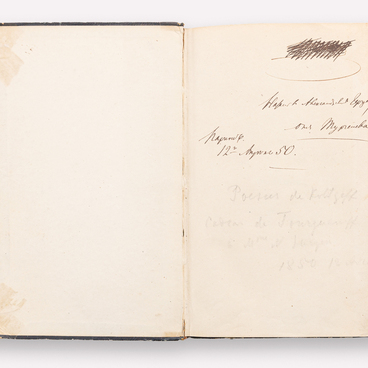The
displayed book has a cardboard cover and a black leather spine. It has been
passed down through generations in the Herzen family. On the title page, there
are two dedicatory inscriptions. One of them was written by Alexander Herzen’s
wife and dedicated to their daughter Natalya. It reads, “Nice. 1851. To Tata.” The other one was written by Natalya herself and
addressed to her niece, Germaine Monod,
Russian alphabet book by Nikolay Gretsch
My dear Zizi, take good care of this. Tata Herzen. April 28, 1889. Versailles.
The book’s pages feature visible pencil marks made by Alexander Herzen’s son, Kolya, who was born shortly before the New Year’s Eve of 1844. Alexander Herzen wrote to the historian Timofey Granovsky,
At one o’clock in the morning, my son Nikolay was born, with Dr. Alfonsky present. The child is healthy, and Natasha is as usual. I’m afraid to jinx it. It feels like a weight has been lifted off my chest, and I feel like crying. So far, everything seems fine, but I have already experienced this before. Tell Galakhov, Korsh, and Kryukov about it…
Later, Timofey Granovsky saw Kolya and held a pocket watch up to the boy’s ear to discover that the child had a hearing difficulty. Back then, only European doctors could help him.
In 1847, Alexander Herzen and his family went abroad hoping to improve their son’s health. In Switzerland, Kolya started to show some improvement. However, in the fall of 1851, he died tragically together with his grandmother when their passenger steamer sank in the Mediterranean Sea. One of the few remaining possessions of Kolya was the alphabet book, which ended up with his sister Tata. For many years, the eldest of Herzen’s daughters kept the book as a precious memory. Eventually, she presented it to her niece, Olga’s daughter.
In the 1970s, the great-grandchildren of Alexander
Herzen donated the book to the museum. It was important for the writer that his
children did not forget the Russian language, even while living abroad. All of
them, except for the eldest child Sasha, learned to read and write far away
from Russia, using this alphabet book among other resources. In 1853, Herzen
wrote to his friends in Moscow from England,
I believe in Russia and love it. I do not want my children to grow up as foreigners.
The publisher of the alphabet book, Nikolay Gretsch, was a writer, editor, journalist, philologist, teacher, and translator. He was friends with the Decembrists and worked with Kondraty Ryleyev and Alexander Bestuzhev on the almanac “The Polar Star”. His most famous work is his memoirs “Notes on My Life”.





